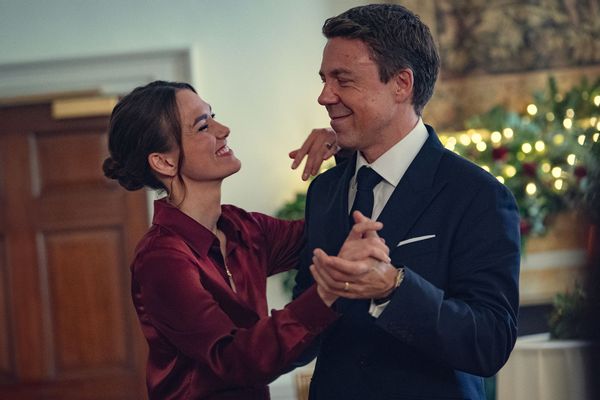
Every culture has its bewildering holiday traditions. One that never gets old for Americans is arguing over Christmas movies. Although Netflix's action thriller “Black Doves” is set in London, it traffics in its version of this debate when two assassins and a civilian discuss their favorite Christmas movies to pass the time.
“The Santa Clause,” Tim Allen’s famous ho-ho-holiday flick gets some respect from one of the triggermen, Eleanor (Gabrielle Creevy). “The Holiday,” Nancy Meyers’ gentle Yanks-meet-Brits romance, is deemed garbage. Considering the series’ tone and genre, one may expect the conversion to shift into the age-old “Die Hard” debate – but series creator Joe Barton is slyer than that.
At the core of that playful, pointless dispute is whether John McClane’s year-end vacation is or isn’t a Christmas movie. Barton writes all six episodes of his deadly spy game as an argument that it – and every other bloody festive spectacular – absolutely is without dropping titles or catchphrases.
Mind you, the audience’s playful arguments on this topic amount to little more than ritualistic pantomime these days. Christmas action flicks are pretty much a legitimate subgenre that this fishtails into quite smoothly.
“Black Doves” invites us to binge the tale of Helen Webb (Keira Knightley) — devoted wife of high-level government official Wallace Webb (Andrew Buchan), and mother to adorable twins.
Wallace is a solid, morally sound politician in a nest of corruption. He loves his family and is as sexually arousing as unbuttered toast, but he's reliable. Helen is slender, attractive, cheerful and makes Wallace look like future prime minister material.

Helen also has a secret lover named Jason (Andrew Koji) who, unfortunately for all Londoners counting on peace on earth and mercy mild, is killed along with other seemingly ordinary people. Hearing this lights the candle of Helen’s homicidal rampage, and before the first episode cuts to black, she has traded making Christmas pudding for a knife fight that ends with her covered in a stranger’s blood.
This story pitch reads as if it were designed to goose the almighty streaming algorithm – “Make it 'The Long Kiss Goodnight,' only with the dream girl from 'Love Actually'!” Sure, why not? In rankings of holiday movies that spur violent disagreement, “Love Actually” sits pretty high on the list. And Helen’s life has a lot in common with that of Geena Davis’ heroine in “The Long Kiss Goodnight.” That shoot-'em-up – a favorite of both mine and Samuel L. Jackson — introduces Davis as a devoted mother, community pillar and schoolteacher named Samantha Caine.
Only, oopsie doodle, due to a serious knock on the head, Samantha forgot that she’s actually a CIA-trained black-ops agent. Her real name is Charly Baltimore.
Debates about “Love Actually” are mainly about the quality of its schmaltz. Everyone accepts that’s a Christmas romance. In contrast, the weakest arguments against awarding jingle bell designations to “Die Hard,” “Lethal Weapon,” “The Long Kiss Goodnight,” “Kiss Kiss Bang Bang” hold to the Hallmark definition of what holiday movies are supposed to be.
Ordeals, such as they are, tend to be minor and surmountable; notions that everything is lost amount of misunderstandings. Everything is solved by the time Christmas day rolls around, and in plenty of time to gather ‘round the roast beast.
But anybody who can quote, say, signature lines from “Lethal Weapon” and other holly-jolly mayhem recognizes those movies follow this structure almost to the cranberry. The main departure is in the scope of the conflict: its heroes are out to save their nations or the world. Salvaging their personal lives is secondary, although frequently central to their mission success; nothing motivates a person like love. If a few evildoers are erased in this days-long Festivus airing of grievances, that’s a stocking-stuffer bonus.
For those of us who feel the annual pull of loneliness, and fatigue or, for whatever reason, can’t quite flip their joy switches into “on” mode, these movies are validating. All the great modern Christmas action classics give us heroes pretending to be something they’re not at first before passing through a crucible that brings them closer to their truer selves.

This locks in the legitimacy of its Christmas entertainment designation by the barest of definition. Not only does “Black Doves” close on Dec. 25 but, like the great yuletide bullet storms that came before it, it ends within the spirit of its celebration.
The understanding we’re left with, though, is this peace is temporary. (Netflix confirmed that by greenlighting it for a second season before its debut.) This is the eternal utility of all Christmas action movies – their acknowledgment that the sparkly and mercilessly upbeat mood engulfing the season is artificial. It’s tinsel.
Watching their bloodied, bruised heroes emerge from whatever piles of flaming wreckage they’ve wrought amid so much forced merriment has a way of boosting our morale out of the humbug doldrums. Everything seems like it’s back to normal. Everyone’s problems appear to vanish. For a short while, anyway, it feels OK to have hope again, the energy we need to steady ourselves for whatever the sequels have in store.
All six episodes of "Black Doves" Season 1 is streaming on Netflix.







